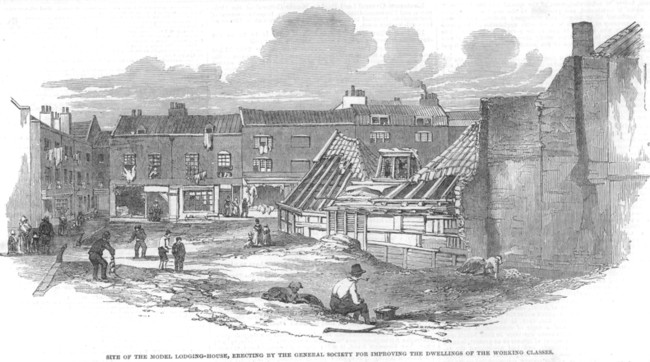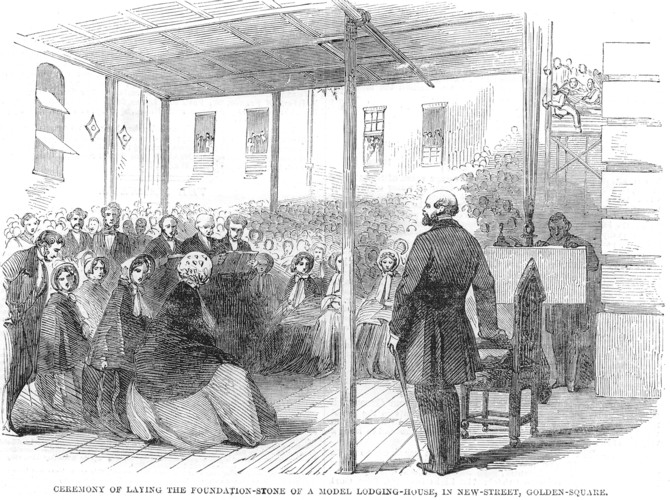
Site of the Model Lodging-House, erecting by the General Society for the Improving the Dwellings of the Working Classes.
This important social measure is at present occupying a considerable share of the attention of the philanthropic public; and a very gratifying instance of which was manifested on Tuesday last. The scene of operation (which our Artist has depicted in the first of the accompanying Illustrations) was, a short time since, a sadly-neglected portion of the wealthy parish of St. James, long known as one of the "rookeries" of the metropolis; namely, a piece of ground in the rear of the brewery of Messrs. Coding and Co., in Broad-street, Golden-square. Looking upon this picture, and contrasting it with the courtly associations of St. James's, we may well say what extremes of wealth and want meet in this great town! However, a great clearance has been made of the crazy buildings shown in the first Sketch; and upon the site the General Society for Improving the Dwellings of the Working-classes have for some time been at work. Here was, until lately, a quadrangle of wretched hovels, in which cows and pigs shared the occupancy with thieves and other abandoned characters both male and female, who demoralised and disturbed the whole neighbourhood by their drunken orgies and fracas. The hovels have been cleared away, the cattle and swine sent to more fitting quarters, and all that remains of the vile place is a fractional portion of the old corner public-house, once notorious for being the haunt of the worst of characters, and soon to pass away along with the other abominations. The new building will consist of a neat front elevation, with stone copings and three entrances; and will contain 68 separate residences, each consisting of three good rooms, with water, water-closets, and other domestic appliances. The whole will be let at rents less than are at present paid for wretched accommodation ; and lilt experiment which has already been made on a smaller scale in the district justifies the hope that the undertaking will be not only beneficial to the classes for whose use it is intended, but will combine profit with benevolent gratification for the Society.
Tuesday last was the day fixed for the inaugeration ceremonies at the new building in progress. By two o'clock, Her Grace the Duchess of Sutherland, Lady Blantyre, Earl Talbot, Viscount Ingestre, with several other members of the nobility had arrived; and, shortly after, his Royal Highness the Duke of Cambridge, who had consented to lay the first stone. His Royal Highness was received with loud cheering by the crowds, who not only filled the enclosure. but also thronged all the approaches to the new works. The band of the 1st Life Guards was in attendance, and played frequently during the proceedings. The ceremonial (which our Artist has sketched) was commenced by the Bishop Elect of Lincoln (Rector of St. James's), were offered up an appropriate prayer; after which the children of the St. James's School sang the Old Hundredth Psalm—a remarkably fine effect being given to the music by the admirable accompaniment of the military band.
The usual deposit of coins was then laid on the stone, and a glass vessel, containing the following inscription:—"To the glory of God and the well-being of his creatures, these buildings, intended as a home for the families of the labouring classes, were erected by the General Society for Improving the Dwellings of the Working Classes, on a site once occupied by the most wretched hovels. The first stone was laid on the 12th of April, 1853, by the patron, H.R.H. George Duke of Cambridge, K.G. The Rev. J. Jackson, D.D., Bishop Elect of Lincoln, asked a blessing on the work; and Viscount Ingestre, president, and other members on the society, were present, together with Charles Lee, Esq., hon. architect."
After these preliminary preparations, and while the stone was being slowly lowered, Viscount Ingestre read an address to His Royal Highness the Duke of Cambridge, detailing the circumstances we have narrated, and concluding with these emphatic words:—
We feel that your Royal highness, in thus inaugurating this great effort, is binding closer the ties which unite the different classes of our countrymen, whilst every recognition of the claims of labour adds lustre to exalted rank, and is a good omen for coming times. These buildings, designed doubtless long to survive those who reared them, will be one of the many monuments we bequeath to a future generation. They will show that whilst we left much still to be done, the ties of country and the bonds of brotherhood were not with us altogether an empty name. May your Royal highness long be spared among us the honoured instrument of works of kindness, with which the name you bear has been long connected (Cheers).
His Royal Highness having listened with much attention to the address, bowed in acknowledgement of the special allusion to himself with which it terminated, and proceeded to the usual manipulations with a handsome silver trowel and mahogany mallet; and having tested the accuracy of his work by a scientific application of the plumb line, the stone was allowed to rest in its permanent location. The president, Viscount Ingestre, then briefly thanked his Royal Highness for his attendance, in the name of the society; after which his Royal Highness said:—
My Lord Ingestre, Ladies and Gentlemen,—It has afforded me the highest gratification to be permitted to lay the first stone of this good, and I hope it will ultimately prove, great undertaking. But a year since I took the chair it a preliminary meeting, and it is most satisfactory to me to see the progress that has been made in that short space of time (Hear, hear ). I trust that our present ceremonial of laying the first stone will prove an earnest that the good work will be continued and extended as it has been begun, and thereby will conduce to the comforts and advancement, both here and hereafter, of numerous and deserving classes of our fellow-countrymen. I trust that it will continue to receive your steadfast and earnest support (Loud cheers).
This Royal Highness was again much cheered on his departure.
In the evening, the event of the day was celebrated by a dinner at the London Tavern, at which nearly one hundred and fifty noblemen and gentlemen were present. The Duke of Argyll, who ably filled the chair, was supported by Earl Talbot, Earl Jermyn, Earl Grosvenor, the Earl of Annesley, the Earl of Sheffield, Viscount Ingestre, Lord Emlyn, Lord Dufferin, Lord Dynevor, Lord Hervey, the Right Hon. Sir J. Pakington, Bart., M.P. ; Hon. W. Cowper, M.P.; Sir J. V. Shelley, M.P. ; Mr. J. E. Denison, M.P. Sir W. Frazer; Hon. F. Byng, &c. Mr. Disraeli had accepted an invitation to be present, but a sense of public duty compelled hint to be present in the House of Common, during the debate on the abolition of Kilmainham Hospital.
The band of the First Life Guards was in attendance, and supplied the place of vocalists.
On the removal of the cloth, and after the usual loyal toasts had been duly honoured, Sir J. Pakington, in giving the Health of the patron, the Duke of Cambridge, the Bishop elect of Lincoln, and all who had assisted at the ceremony of the morning, paid a graceful compliment to Viscount Ingestre. The part which this young nobleman has taken in the formation of this society had been already dwelt upon by the noble Duke in the chair; and Sir J. Pakington, having a strong regard for the noble Lord, and an old friendship for his family, could not refrain from expressing his satisfaction at the course he had taken. His young friend, he said, had nobly taken the path of virtue, and he would surely find it to be the path of Honour.
The noble Chairman, in giving the toast of the evening, declared that the state of a great proportion of the population of our cities was more deplorable than the heathendom of Africa, and demanded more of the missionary spirit than might be required under the palms of India. A lady of his acquaintance had told him that, in her young days the condition of file poor never formed a topic of conversation with the higher classes; now they made strenuous exertions in their behalf, and such exertions had never such prospect of success as at present, because we had got hold of the right principle, and had ascertained the inseparable connection there existed between the physical and moral condition of the people. The plan of the society contemplated partly the erection of new, and partly the adaptation of old buildings; and in the parent society, presided over by Prince Albert, that plan had produced a profit of from 4.5 to 5 per cent. This advantage had been secured, in addition to an enormous saving in the rentals of the poor; and therefore he trusted that such societies would spread, and be taken up by speculators sorely on commercial principles. It was a great economic law that nothing could be permanently successful that was not self-supporting; but it the establishment of the society should be successful, it would achieve the great moral result of giving to all classes the blessing of a decent Christian home. His Grace concluded by giving "Success to the General Society for Improving the Dwellings of the Working-Classes." The toast was received with great enthusiasm.
Viscount Ingestre gave "The health of the Chairman," thanking his Grace warmly for his attendance that evening, and for his able advocacy of their cause. His Lordship also took occasion to acknowledge the support he had received from the metropolitan clergy, and from the Corporation of London.
Lord Dynevor, in giving "The health of Lord Ingestre, president of the institute, "mentioned that the building would be open in September next, at a cost of £10,000, of which £5000 had already been received in the course of the past year.
Viscount Ingestre explained that the project had been first suggested by Lord Shaftesbury. Nobody would, without seeing it, believe the misery that existed in huge towns. It was impossible to do much towards the moral improvement of the people until you first ameliorated their physical condition. It was of no use the clergy preaching or building churches until the people had first decent and Christian homes to live in.
Sir William Frazer gave the healths of the honorary officers of the society—Messrs. C. Lee, honorary architect; G. F. Smith, honorary solicitor; and the Rev. Messrs. Beames and Stamforth, honorary secretaries; bearing warm testimony to the value of their various services. One of them (Mr. Beames) had written a book, " The Rookeries of London," which he recommended every one to read ; and all had unhesitatingly given up their valuable time to the society. He believed that the undertaking would pay five per cent, and on that expectation he founded his hopes of its success.
Mr. C. Lee acknowledged the compliment, and stated that during the twenty-five years he had been in practice, the poor in London had been gradually growing worse. Every improvement had swept hundreds of them away and it was the painful scenes he had himself witnessed in this way that had induced him warmly to promote the present undertaking. The collection of the evening was announced to be nearly £800.
